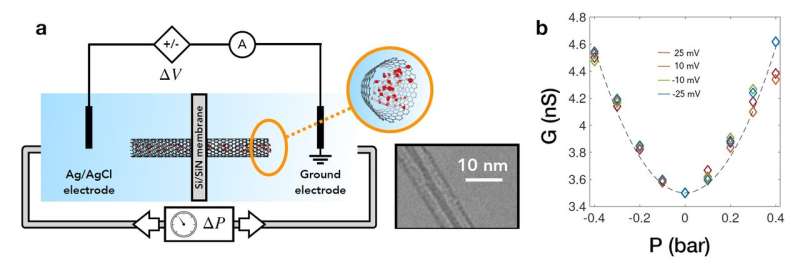Credit: The Physics Laboratory of the Ecole Normale Supérieure
Nanofluidics, the field which studies nanoscale flows, has made considerable progress in recent years. The field is blossoming thanks to the development of new materials, in particular nanotubes and 2-D materials, which allows fabricating well-controlled nanofluidic devices amenable to the investigation of nanofluidic properties down to the smallest scales.
However, in spite of the wealth of new behaviors reported in the artificial nanochannels, they are still far from the impressive complexity of the biological machinery. Nature does many exquisite things with ions and fluids at small scales, and in a very efficient way: one may cite, for example, activated transport, ionic pumping, information storage, etc. Getting inspiration from some of these functionalities to reproduce them in artificial devices would be a quantum leap to develop iontronics.
Many biological devices exhibit activated responses under various stimuli, and one such behavior is the mechano-transduction channels involved for instance in touch sensing or ear hair cells. In the present paper, we show that tiny (single digit) carbon nanotubes, with a radius of 2nm, do exhibit a mechano-sensitive response, which is furthermore very similar to that of their biological counterpart, with the conductance of the CNT exhibiting a strong and quadratic dependence on the applied pressure.
We can even rationalize this behavior theoretically with an analytical prediction for the pressure-dependent conductance. This demonstrates, incidentally, that the mechano-sensitive response takes its root in the ultra-low friction exhibited by carbon nanotube with the smallest size. This demonstrates the further uniqueness of carbon nanotubes materials as water and ion transporters. We exploit here its unique properties to induce non-linear, stimulated transport.
This phenomenon opens new possibilities for the development of advanced iontronic functions in the future. The demonstrated behavior constitutes a prerequisite to build integrated nanofluidic systems, and such a mechano-sensitive response is a building block to develop touch and sensing at the nanoscales inspired by biological systems.
More information: Alice Marcotte et al. Mechanically activated ionic transport across single-digit carbon nanotubes, Nature Materials (2020). DOI: 10.1038/s41563-020-0726-4
Journal information: Nature Materials
























